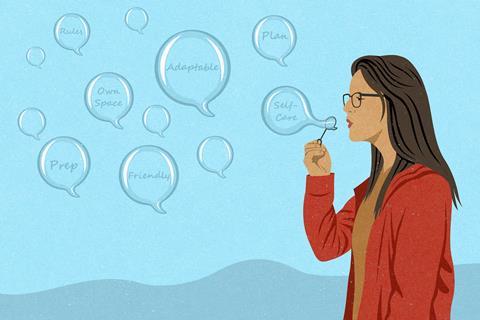From preparing your classroom and planning your lessons, here is everything you need to appear calm and collected in your first year of chemistry teaching
In 2020, chemistry teacher Laura Scoular mentored probationer chemistry teacher Hayley Russell. Their successful mentoring partnership has since evolved, leading the pair to create a podcast, run CPD events for student and probationary science teachers and now write for EiC – the latter just as Hayley begins to mentor a probationer (NQT) herself. So let’s eavesdrop on their conversation about mentoring and find out what tips Laura can give Hayley, and what advice they both have for student and probationer teachers.

HAYLEY RUSSELL: What should probationers do before starting?
LAURA SCOULAR: If possible, make contact with their school and arrange a visit. It makes the first day much easier if they have a rough idea of where they are going and who the members of the department are. They might get their timetable but should be aware it may change when recoursing takes place in August.
HAYLEY: Ok, great. Not all of our probationers this year will have their own classroom. I was lucky enough to have one last year so haven’t experienced that.
LAURA: Most probationers don’t. It just means they will need to be super organised. I would recommend getting a trolley and try to have a cupboard or space for resources in every classroom they teach in. It’s helpful to know where the apparatus is in each classroom (and to know the layout).
HAYLEY: Great. I’ll remind them to always leave classrooms the way they find them. Never leave a colleague’s room messy!
Planning and admin
HAYLEY: I’m making a list of admin tasks probationers are accountable for. I know that they have to keep their folder and GTC profile up-to-date and it’s really important to take the time every week to do this. What else do you think is important?
LAURA: Other things they will be responsible for are day-to-day admin tasks like registers, following school policies, additional support needs and plans for individual pupils, filing pupil evidence, additional assessment arrangements and tracking data.
HAYLEY: Excellent, I have everything. What information should I give the probationer on how much lesson planning should be done before starting? I know I did a bit too much!
LAURA: I couldn’t quite believe just how organised you were before starting. I would advise not spending the whole summer prepping lessons. It’s important to have a good break before starting what will be a challenging year.
HAYLEY: I think you told me I should have introduction lessons for each class. This could be ice-breakers or previous knowledge quizzes for senior phase classes.
LAURA: It’s important they get to know their classes before getting started with ‘real teaching’. Pupils also need to get to know them. It’s important classes know what to call their teacher and how to spell their name.
HAYLEY: I like to get classes to make up their own rules. It means they know the expectations and consequences.
LAURA: I really liked how you did this. It was good seeing them displayed on the walls so classes could refer to them at any time.
Seating plans
LAURA: While we are looking at starting off, lots of people worry about how to assign seats.
HAYLEY: This can be stressful. I don’t think there are any rules. It’s useful to talk to a class’s previous teachers or, if it’s an S1 class (year 7), read their primary profiles.
LAURA: Sometimes I let the pupils pick. Makes it interesting and lets you see where the friendship groups are.
HAYLEY: As long as the pupils know they can be moved at any time. Sometimes I arrange them by height order, or alphabetically. I would avoid gender splitting.
LAURA: Some people prefer to do it randomly. There are some alternative ideas in Bill Wilkinson’s article about new classes.
HAYLEY: I’ve made a note about CPD, training and extracurricular activities but I guess these will vary across schools.
LAURA: Yes, they will find out more about this during the year. It should be easier to be involved with extracurricular events this year. They let you build relationships with more staff and pupils.
HAYLEY: It’s important to make sure it’s something you’re interested in though, so you enjoy it.
Top tips for a successful probationary/NQT year
First year tips
Laura and Hayley’s top 5 tips for success in your probationary/NQT year
- Make friends – not just in your own department – and meet for lunch at least once a month.
- Get to know all the pupil support departments, technicians, janitors, office staff and cleaners.
- Familiarise yourself with two thirds of the courses you are teaching – get to know the course specification and common past paper questions.
- Learn your school’s online systems – store online and local copies of everything.
- Be organised so that you can either come in early or stay late – don’t do both!
HAYLEY: I think we’re just about done. What do you think are the main challenges of probation year?
LAURA: I reckon you could answer this one better than me! I think, at first, it is very difficult to ask for help. This gets easier as they get to know their mentor and department better but they need to be honest if they are struggling, so that you can help.
HAYLEY: It takes a while to get used to teaching without supervision. Although they should always be prepared for drop-ins! Lesson observations are super helpful. I just hope that they don’t take any feedback personally; it’s all constructive to help them improve.
LAURA: Recommend that they observe others too.
I think not letting school take over must be a huge challenge. There is so much to learn in your first year.
HAYLEY: I think one of the biggest challenges is establishing yourself and making your mark.
LAURA: That’s true but they need to show no fear. Pupils don’t know they are new to teaching unless they tell them.
What about non-contact time? It can be very tempting to relax with a coffee.
HAYLEY: It’s really important to use this effectively. I always start with a to-do list.
LAURA: Not too big though. Small achievable tasks are best.
HAYLEY: Resource development – putting your own spin on things. And keeping on top of the never-ending pile of marking.
LAURA: Planning – try to do it a week in advance along with any technician orders. Practise experiments. It is crucial you know what you are doing before doing it with a class.
HAYLEY: We have covered just about everything, but we can’t forget the teacher self-care kit (or cupboard in my case).
LAURA: I loved this cupboard. If anyone needed anything you always had it. Do you still have one now?
HAYLEY: Yes, I have hot and cold drinks, sugary treats, spare dry food for lunches, a toothbrush, plasters, painkillers, tissues, socks … everything but the kitchen sink.
LAURA: You’re hilarious. But it is very helpful to be prepared for any situation. In fact, that is my one final top tip. Be prepared for anything and be adaptable and fluid – you are in charge now. It is your classroom and you are the teacher!
Tune into Hayley and Laura’s podcast for tips on how to achieve a good work–life balance.
Tune into Hayley and Laura’s podcast for tips on how to achieve a good work–life balance: spoti.fi/3PDsbCt
Early career conversations

Essential advice for your first years of teaching in the science classroom, from a recent probationary teacher and her mentor
- 1
- 2
 Currently
reading
Currently
reading
Ready? Get set … go!
- 4
- 5
- 6
- 7






















No comments yet